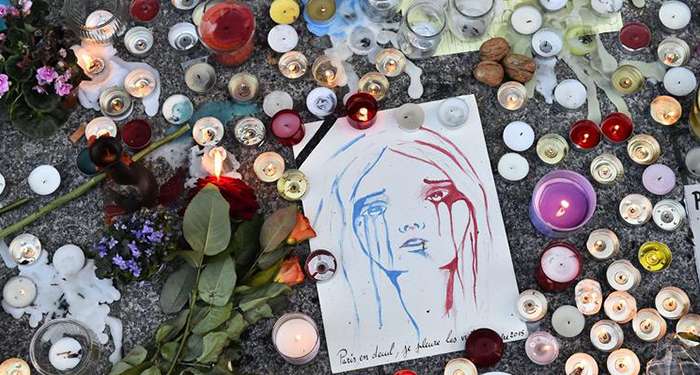
Candles have been lit at a makeshift memorial in front of “Le carillon” restaurant one of the site of the attacks in Paris on November 15, 2015, in the 10th district of Paris. (LOIC VENANCE / AFP/Getty Images)
Chicago Tribune columnist Dawn Trice, writing on the terrorist attacks in Paris, mentions the Great Cities Institute’s recent symposium, “City/Cite: A Transatlantic Exchange.” The symposium featured Andrew Diamond, a professor of American history at the Paris-Sorbonne University and a former Chicagoan who wrote “Mean Streets: Chicago Youth and the Everyday Struggle for Empowerment in the Multiracial City, 1908-1969.”
Andrew Diamond lives near the Canal Saint Martin in Paris’ 10th Arrondissement, a five-minute walk from a popular intersection that’s home to a Cambodian restaurant, a pizzeria and a bar with an expansive terrace frequented by tourists and the neighborhood’s “Bobos,” or artsy bourgeois bohemians.
It was in this area where one of Friday’s terror attacks occurred.
A professor of American history and civilization at the Paris-Sorbonne University, Diamond lived in Chicago when he wrote “Mean Streets: Chicago Youths and the Everyday Struggle for Empowerment in the Multiracial City, 1908-1969.”
I talked to him Sunday afternoon because earlier this month he returned to Chicago for a trans-Atlantic symposium that included discussions on how high unemployment, income inequality, social exclusion, poverty, and racism in Paris and in Chicago can make it easier for young folks to be radicalized.
These conditions also inspire marginalized and disaffected youth to join gangs of thugs who commit horrendous acts of terror — or as we prefer to call it here in Chicago, gun violence. On both continents, the weaponry is too easily accessible.
The symposium, called “City/Cité: A Transatlantic Exchange,” was a joint production of Chicago’s French Consulate, the University of Chicago and the Great Cities Institute at the University of Illinois at Chicago.


